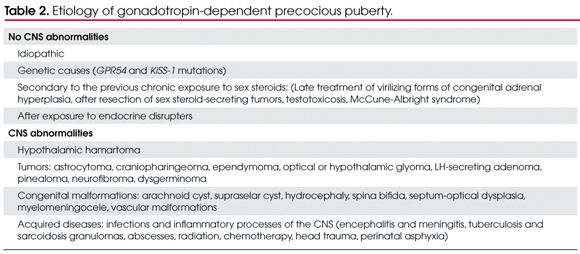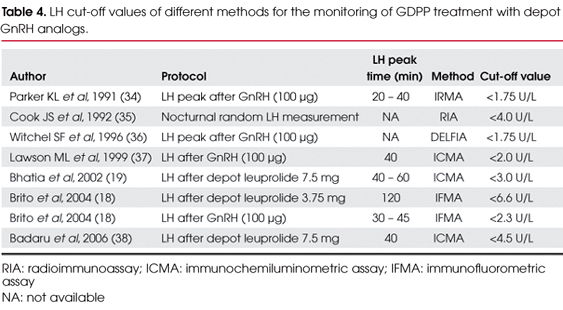Precocious puberty is defined as the development of secondary sexual characteristics before the age of 8 years in girls and 9 years in boys. Gonadotropin-dependent precocious puberty (GDPP) results from the premature activation of the hypothalamic-pituitary-gonadal axis and mimics the physiological pubertal development, although at an inadequate chronological age. Hormonal evaluation, mainly through basal and GnRH-stimulated LH levels shows activation of the gonadotropic axis. Gonadotropin-independent precocious puberty (GIPP) is the result of the secretion of sex steroids, independently from the activation of the gonadotropic axis. Several genetic causes, including constitutive activating mutations in the human LH-receptor gene and activating mutations in the Gs protein a-subunit gene are described as the etiology of testotoxicosis and McCune-Albright syndrome, respectively. The differential diagnosis between GDPP and GIPP has direct implications on the therapeutic option. Long-acting gonadotropin-releasing hormone (GnRH) analogs are the treatment of choice in GDPP. The treatment monitoring is carried out by clinical examination, hormonal evaluation measurements and image studies. For treatment of GIPP, drugs that act by blocking the action of sex steroids on their specific receptors (cyproterone, tamoxifen) or through their synthesis (ketoconazole, medroxyprogesterone, aromatase inhibitors) are used. In addition, variants of the normal pubertal development include isolated forms of precocious thelarche, precocious pubarche and precocious menarche. Here, we provide an update on the etiology, diagnosis and management of sexual precocity.
Precocious puberty; GnRH analogs; Precocious thelarche; Precocious pu-barche; Testotoxicosis; McCune Albright syndrome





